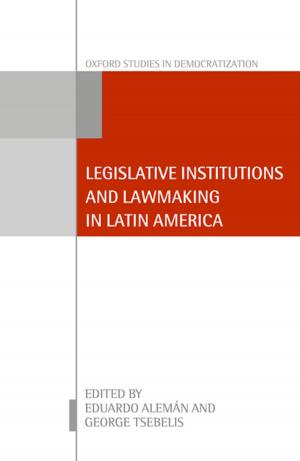Complex Inferiorities
The Poetics of the Weaker Voice in Latin Literature
Fiction & Literature, Literary Theory & Criticism, Ancient & Classical, Nonfiction, Social & Cultural Studies, Social Science| Author: | ISBN: | 9780192543790 | |
| Publisher: | OUP Oxford | Publication: | November 1, 2018 |
| Imprint: | OUP Oxford | Language: | English |
| Author: | |
| ISBN: | 9780192543790 |
| Publisher: | OUP Oxford |
| Publication: | November 1, 2018 |
| Imprint: | OUP Oxford |
| Language: | English |
This volume investigates an important and surprisingly widespread phenomenon in Latin literature, which has to date received little sustained discussion: the deliberate assumption of a weaker voice by speakers who in fact hold sufficient status not to be forced into this position. Though often associated with the markers of imperial hegemony and elite speech, Latin literature evinces a remarkably broad range of strategies designed to enable the adoption of a markedly disempowered voice. The series of case studies collected together in Complex Inferiorities cover a wide range of genres, periods, and authors: from topoi such as recusatio (professing a lack of ability to write in status-conforming, superior genres) and rhetorical devices such as prosopopoeia (artfully and strategically adopting a persona to garner favour, even when this means temporarily forfeiting one's higher status and discursive privileges), to the long-silenced female heroines of Ovid's Heroides and satire's irreverent take on the great and the good by framing its narratives as being articulated 'from below'. Even large-scale cultural self-positionings fall within this scope, be they expressions of Roman cultural inferiority vis-à-vis classical Greece or the tensions that arise between humble (yet spiritually superior) Christian writers and their grand, canonical, and classical (yet pagan) predecessors. In demonstrating that re-negotiating alleged weakness constitutes a central activity in Latin literature, this volume reveals the extent of the literary and cultural-political possibilities opened up by assuming and speaking in voices of weakness and inferiority. Authored by experts in their fields, the individual chapters explore the crucial role of the 'weaker voice' in establishing, perpetuating, and challenging hierarchies and values in a wide range of contexts - from poetics and choices of genre, to social status and intra- and intercultural relations - and offer invaluable insights not only for the study of classics, but for literary and cultural studies across the humanities.
This volume investigates an important and surprisingly widespread phenomenon in Latin literature, which has to date received little sustained discussion: the deliberate assumption of a weaker voice by speakers who in fact hold sufficient status not to be forced into this position. Though often associated with the markers of imperial hegemony and elite speech, Latin literature evinces a remarkably broad range of strategies designed to enable the adoption of a markedly disempowered voice. The series of case studies collected together in Complex Inferiorities cover a wide range of genres, periods, and authors: from topoi such as recusatio (professing a lack of ability to write in status-conforming, superior genres) and rhetorical devices such as prosopopoeia (artfully and strategically adopting a persona to garner favour, even when this means temporarily forfeiting one's higher status and discursive privileges), to the long-silenced female heroines of Ovid's Heroides and satire's irreverent take on the great and the good by framing its narratives as being articulated 'from below'. Even large-scale cultural self-positionings fall within this scope, be they expressions of Roman cultural inferiority vis-à-vis classical Greece or the tensions that arise between humble (yet spiritually superior) Christian writers and their grand, canonical, and classical (yet pagan) predecessors. In demonstrating that re-negotiating alleged weakness constitutes a central activity in Latin literature, this volume reveals the extent of the literary and cultural-political possibilities opened up by assuming and speaking in voices of weakness and inferiority. Authored by experts in their fields, the individual chapters explore the crucial role of the 'weaker voice' in establishing, perpetuating, and challenging hierarchies and values in a wide range of contexts - from poetics and choices of genre, to social status and intra- and intercultural relations - and offer invaluable insights not only for the study of classics, but for literary and cultural studies across the humanities.















